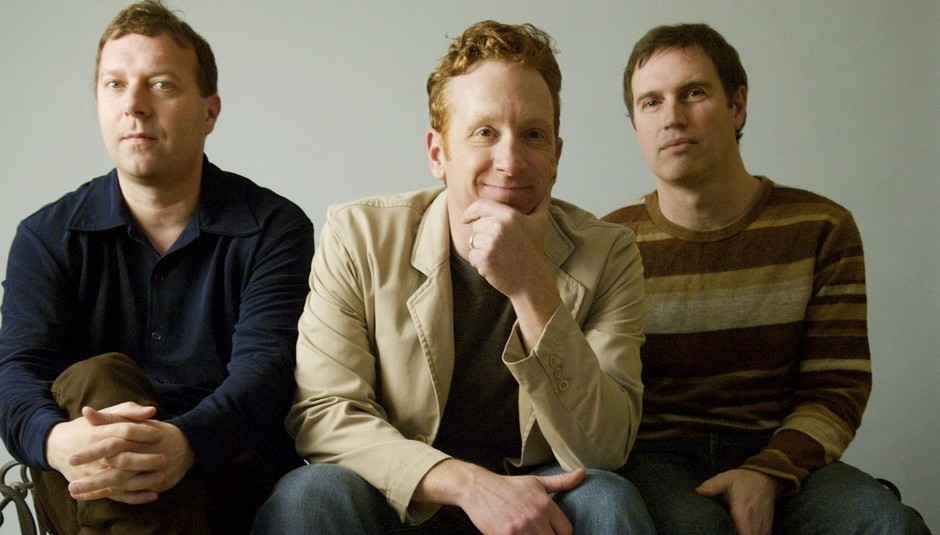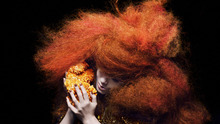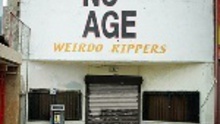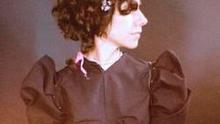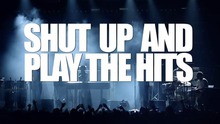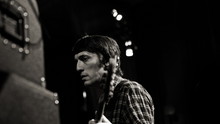Hailing from Boston, Massachusetts, Buffalo Tom emerged from the same US underground scene as Dinosaur Jr and Pixies at the tail end of the 1980s. The trio - Bill Janovitz (vocals & guitar), Chris Colbourn (bass), and Tom Maginnis (drums) - made a name for themselves right from their earliest days both as a formidable live band and recording artists of some distinction.
Since putting out their self-titled debut in 1988 they've gone on to release a further seven albums culminating in 2011's Skins. This year marks the 25th anniversary of Let Me Come Over, their third and in many people's eyes definitive long player to date. To commemorate this landmark, the band are releasing a special edition of the album on 19th May while also playing a handful of shows to coincide including a date at Islington Assembly Hall on 9th June.
DiS caught up with frontman Janovitz to talk about the making of Let Me Come Over, how grunge crossing over to the mainstream affected the scene at the time, and what the future holds for Buffalo Tom.
You're releasing a special edition of Let Me Come Over in May to commemorate its 25th anniversary. Does it seem like 25 years to you since the album came out?
Some of my days feel like 25 years so I guess it depends on how you look at it! When I think of all the other things that have happened around that time - 1992 was the year I got married - sometimes it feels like its flown by so fast. Then I look back at some specifics - especially if you look back at photos - and I was actually 25 years of age back then. When we were really on the cycle and not taking a break from touring or recording that really matters too. Because we went on hiatus for quite a few years it makes it seem a long time ago.
What memories do you have of recording the album? How did the record first come together?
There were a couple of key things I guess. We were still working in day jobs when we made our first two records and that had all changed by the time we started recording the third album. It wasn't a big money making affair. We formed at University and felt fortunate to have made one record. That first album led to a deal with Beggars Banquet in the UK and it looked like it could be more of a serious thing. There was a contract for a couple of records but it wasn't like we were getting huge advances or anything like that. We kept things really modest within our recording budgets, and we were all living separately with our girlfriends. It wasn't like we were pooling our resources and living the lives of the bourgeois.
Did you feel under any pressure being on a label like Beggars Banquet? Did it change your approach to songwriting in any way?
There weren't any commercial concerns like that. When we finished recording our first album we'd already started working on our second (Birdbrain) and gone out on tour, so it was all really compacted. Once we'd gone out on the road we stayed there, and while I don't want to call it a lifestyle aesthetic as such, it made us think if we kept on recording and touring we'd eventually be able to give up our day jobs. The first record was put together in a kind of piecemeal fashion. We used whatever we could scrape up moneywise to afford to go into the studio, and we had J Mascis produce it. And that was the same with the second one, so by the time we started making Let Me Come Over we felt pretty confident and we were working with a different producer (Sean Slade) at Fort Apache Studios who had a partnership with Paul Kolderie. They'd known each other since school and had a band together so they were forming quite a steady co-production partnership. So we wanted both of them on the third record. We'd done the first two records at Fort Apache too and we'd heard about this place in Woodstock, so we asked if there was any chance we could go away and the record there instead. This place called Dreamland Studios that was in a converted church in the woods in the Catskill Mountains. So it was a really romantic setting and it lived up to its romanticism, and we did about three days worth of basic tracks there. Our only regret was that we didn't have the budget to stay up there for the whole record. It was such a beautiful, conducive atmosphere. So we did some tracks there and brought them back to Fort Apache. We'd been finding our way on the first two records and I think we felt we'd really struck upon our sound and what we were about, so by the time we came to writing Let Me Come Over we were much more confident and I feel it was by far our best record up to that point. When we played the material live we were doing different things with acoustic guitars and e-bows. I think we let our rootsy influences show through and we were much more comfortable with that.
There's certainly a massive difference between something like 'Sunflower Suit' off the first record and 'Taillights Fade' or 'Porchlight' from the third one.
They're all from the same family in my brain but I get that. 'Sunflower Suit' is upbeat and thrashy whereas the other two are a lot more reflective. I just see them as part of our continual development really. Its songs like 'Larry' or 'Mineral' or 'Frozen Lake' - breathing songs with a lot more space - that really highlight how much we'd moved on for me. On the first two records, it felt like we'd used all the bandwidth, all the frequencies with big, huge grungey sounding guitars. We were recording very cheaply so it wasn't the best fidelity. With this record, we had more time and more of a budget and I also think it showed that we weren't guys that just listened to Dinosaur Jr or Husker Du or The Replacements. We'd always listened to The Rolling Stones and Van Morrison and Bob Dylan as well.
Were there any songs left over from the sessions that didn't make it onto Let Me Come Over?
No, not really. We used everything we recorded. You have to remember at the time each single release came out on so many different formats that we had various b-sides and extra tracks with each one. We didn't have that much material. It's not like today where you can go and record a song in your basement on Pro Tools. We didn't have a tonne of stuff left over and what we did were used as b-sides. The writing is always a continuum. When people ask me about the songs I sometimes have a job remembering which ones were on which record because I was always writing. I was looking back at some of my old journals that will be included with the re-release of Let Me Come Over and I'm already making notes about songs that ended up on the next record, Big Red Letter Day. It's not that they were recorded at the same time as Let Me Come Over but I did have demo versions at the time. Sketches of songs that would appear later on.
Which songs came first on Let Me Come Over? Are there any that date back to the Birdbrain era?
That's a good question! I think 'Taillights Fade' must have been really early because I specifically remember writing that. I rarely remember things like that but I do 'Taillights Fade', and not because I thought it would be a big breakthrough song. In fact, I was really surprised that it was chosen as a single from that record. I always felt singles should be accessible and grab you by the throat. We had this very small studio apartment with just a couple of rooms. So if I wanted to lay something down really late at night I'd wait until my girlfriend (now wife) was asleep then set everything up in the bathroom because it was the furthest reach from where she was sleeping. I'd sit there with a boombox and record whatever I had and I remember 'Taillights Fade' being one of them. That was very early on. I guess 'Taillights Fade' could have fit on Birdbrain in many ways but I also think we'd started to sound like a different band at that point, and I remember 'Larry' and 'Mineral' also being written around that time which were completely different to anything we'd written or recorded back then.
'Taillights Fade' is probably the song Buffalo Tom are most renowned for. How do you feel about that bearing in mind you've recorded and released five albums since?
There are some anomalies to this rule, but I think most bands find their stride pretty early on with their first few records and I think that was the case with us. Then everything from there is about trying to stretch that a little but also working within your own comfortable confines. With Buffalo Tom we were always trying to push ourselves and we've always remained as close to being a democratic band as possible. That has several plusses and minuses, and one of those is if you look at the Buffalo Tom Venn diagram of overlapping records and the trysts and philosophies that came with those records, it's very difficult to move that much further unless you're all pulling in the same direction. It's not that we felt we'd hit on a formula and we were gonna stick to it. We had changed in a lot of ways from that first record to where we were on Let Me Come Over. I think that record has more of a classic, textured, timeless sound than either of its predecessors. The next record Big Red Letter Day was even more finely honed and produced in many ways, so we were changing the way we did things. But going back to 'Taillights Fade' I don't know why that became our most recognisable song. It became something else - and I don't mean it changed the zeitgeist like Nirvana did. But I remember hearing stories about how people related to that song. What it meant and how it soundtracked certain events in their lives. I'm proud to have any song like that, and if that is the only song of ours which stands out to this today that's fine with me but I don't really look at it like that.
If you had the benefit of hindsight is there anything you'd change or do differently with Let Me Come Over?
That's another interesting question. I'm sure there are. Whenever I revisit those earlier records I'm always intrigued by how different the songs sound from album to album which highlights my point about the writing being a continuum of time. Each record represents a snapshot of our life as a band. Sean (Slade) and Paul (Kolderie) had never used a digital board before so we recorded Let Me Come Over completely in analogue. So when it came to mixing the album it was literally a case of all hands on deck. The three band guys and two producer guys at the board moving the faders up and down until we got the right mix. There was something really cool and organic about it. It felt like a very liberating process right until the end even though the mixes we came up with weren't perfect. But to Beggars Banquet's credit, they recognised we had a strong bunch of songs and so they hired this guy called Ron Saint Germain to mix them instead. He was one of the earliest specialists in remixing - a real hotshot long before remixes became a thing. When we got the mixes back from him I was initially shocked. I couldn't believe how differently they sounded. Not in a bad way, but undeniably how great they were. So we used his mixes and it took us to this other level whereby the songs could now be played on the radio. But going back to the original question, is there anything I'd change about the record? Yeah, I'm sure there is but I'd be hard pressed to name anything specifically. I think if there's one thing I'd change it would be to have the whole budget ready to go from the outset so we could have spent more time at Dreamland. I think if that had happened it would have given us more time to mix it properly before having a remix guy involved. But then at the end of the day, the end product was still great.
The whole grunge phenomenon was growing at pace and gaining momentum around this time. Did you notice things changing around you? Did you start to become treated differently by people within the music industry and the press or notice different people coming to your shows?
Definitely. Just to give you a little context, we didn't expect any level of commercial success when the band started. It was a big deal to us when REM started to have some success. We'd stayed at Peter Buck's house when we played in Athens, Georgia just before their Out Of Time record came out. I remember him playing it to us at the time. So it was a really big deal when they started breaking through onto commercial radio. When we released our first record we were just so happy to have an album out there. Originally we signed to a Dutch label and they licensed it to SST in England which is where Beggars Banquet heard about us. And then to sign for their label which was home to The Fall and The Died Pretty, all these bands that we loved, we were just so thrilled. Each thing was a big deal. We just kept moving those goalposts. So by the time Let Me Come Over was being recorded the grunge thing was happening. It was happening before we even got out of college. I remember seeing Mudhoney around '85 or '86 before we got out of school. That stuff had been going on for a long time, so there was no reason to think there'd be a commercial breakthrough. We played with Soundgarden in a tiny, tiny club in Boston and Pearl Jam opened up for as as well.
So when Let Me Come Over was being recorded it didn't really make a difference. We were never directly influenced by what was going on around us. Its not as if we were actively going against grunge. A lot of the material on that record is quite similar to what some of the bands were doing I guess, but we were more concerned with our own thing. We were too busy writing and when that part was finished making sure we got the songs recorded. In fact, during the recording of Let Me Come Over Tom (Maginnis, drums) went to see Nirvana play this small club in Boston just before Nevermind came out. He came back the next day and said they were the greatest band he'd ever seen. We knew about them but none of us had seen Nirvana up to that point. When Let Me Come Over came out I remember us touring around Europe and we picked up a lot of Nirvana's dates because we both had the same booking agent and they were sky rocketing so a lot of their shows got upgraded to bigger venues and we replaced them in the smaller ones. After that we saw people react to us differently and I guess we did become more commercially viable.
Your videos started to appear on MTV shows like 120 Minutes a lot more frequently after Nirvana broke. Do you think that contributed towards you gaining new fans as well?
It was a weird one with Let Me Come Over because although Beggars Banquet was our UK label, they didn't have a United States presence aside from whoever they made licensing deals with. At the time they were licensing they had a relationship with a college radio promotions company who had their own record label so Beggars set up this minor league/major league deal. So for their major league deal they'd go onto RCA Records and we were just teetering on that when Let Me Come Over started to gain some momentum. A couple of stations finally put us on rotation just as Let Me Come Over was reaching the end of its lifespan and we were starting to work on Big Red Letter Day. I guess we felt Beggars could have made more of an effort earlier on in the album campaign to promote that record than they did. It would have been alive back then, but instead we'd moved onto the next record. Which was fine, but I guess looking back, maybe Let Me Come Over could have been a bigger commercial success. I can't remember the exact decision why that never happened but it was a little frustrating both on Beggars Banquet's part and the American label's part and we were never gonna build on that. But it was a team effort and we all make these decisions, management and labels together. It's not like we went for a more commercial sound with that third record. Everything else changed as a result of what was happening at the time not beforehand. I'm sure trying to get in the studio with Butch Vig would have been virtually impossible after Nevermind came out.
What really appealed to us at the time was The Lemonheads' It's A Shame About Ray, which is an album full of timeless sounds and classic songs. We went for that on Big Red Letter Day with The Robb Brothers who had produced that album. Evan (Dando) and The Lemonheads were friends of ours. We came from the same hometown and toured with them a bunch. We asked them how things had worked out with The Robb Brothers and they said it was great, so we went out to their studio in Hollywood for two months. So when Big Red Letter Day came out it wasn't a hugs surprise. I think it could have been bigger than Let Me Come Over as they were a really accessible bunch of songs. I remember going to different parts of the country, hearing 'Soda Jerk' on the radio and thinking this is tremendous. Then all of a sudden the lunatics were running the asylum! The people that made Nirvana break were now running college radio stations and independent record labels. All of a sudden these people were now in power. It was gratifying to see that hard work start to pay off with Big Red Letter Day and at that point it felt like we were getting more towards the mainstream and becoming rock stars. Then one of our songs 'Late At Night' appeared on a television show called 'My So-Called Life' and we started to notice a lot more young women at our shows. Girls who were big fans of that show. That's when things really started to change.
You're also releasing a live album as part of the Let Me Come Over special edition which was recorded at the University Of London (ULU) in 1992. What made you choose that particular concert for release?
We were more popular in the UK, Belgium and Holland then we were across large parts of America. There were different regions where we'd get played on radio stations which would bring people to our shows, but it was very difficult to base a consistent level of success on touring. Whereas in Europe we seemed to have a fanbase right from the start. People like Everett True, John Peel and Mark Goodier supported us early on, and if any combination of those guys gave you the sign of the cross people paid attention. When we got to London, we added shows at the end of that tour because we were doing so well. We were pretty big in Holland and Belgium then too, and people would always show up at our gigs but it was a pretty sedate crowd. Whereas when we were playing at the Fulham Greyhound or London Town & Country Club or ULU people were just going nuts! There's a You Tube video of the ULU show and its a non-stop stream of guys getting up on stage and stage diving. I remembered that I had the master tapes, the multi-track tapes from that show up in my attic and I had a rough mix on cassette that a guy did in a mobile truck. Nobody remembers why thee was a mobile truck there or who commissioned it. We've spent years trying to find out. Anyway, everybody was into the live recording so I took it down to a local studio here in Boston, had it mixed and it just sounded fantastic. It really captures what we were like live at that time. A thrashy but also pretty well oiled, road readied band. Lots of energy and power. It sounds good. A lot of those sounds were making their live debut at that show too.
The response over here to touring US bands back then was very excitable to say the least. I remember seeing bands like Mudhoney, Sonic Youth, and L7 around that time as well as yourselves and it often resulted in chaos for the security staff at the front trying to control the stage barrier.
I don't know if that's the right word I'm looking for, but it did seem quite laddish whenever we came over here back then. Young University age guys, a lot of drinking, a lot of sweating, that sort of thing. We did have women come up and stagedive at our shows too but that was more later on. It was a real dude thing to begin with, and as we kept coming back we noticed a change in the different flavours of the month on the cover of Sounds or Melody Maker or whoever. It started to turn more inwards after My Bloody Valentine released Loveless. I think the drugs at the time influenced a massive change from booze to ecstasy. Things changed in a big way but I never thought it pushed us out. There was always room for us so if we played Reading people still came to see us. I remember playing thee in '92 and '94 with an amazingly diverse range of acts and it was incredible. I guess that's still going on today at most festivals but that's where it all started. I felt we became a part of that rather than ended up being marginalised. We still drew a crowd at these events.
Buffalo Tom went on a nine-year hiatus after your sixth album Smitten came out in 1998. Was there ever a time during that break where you thought the band might be over?
Yeah, I felt for sure we were done. If we were a more typical band I think we'd have just broken up. But I'm a pretty pragmatic, level-headed kind of guy so what's the point of breaking up? Let's just take a break for a while and if we end up getting back together let's do it. If we had any kind of commercial foresight we'd have definitely said we were breaking up then cashed in on the reunion! It would have been more lucrative but we kept going instead. There were circumstances behind the hiatus and most of those were family related. We were all having kids. I remember sitting down with Martin Mills from Beggars Banquet who is probably the greatest guy in the music business - just a really wise, nice guy who was like a father figure to us. He invited me out one afternoon to this beautiful place and I remember discussing where we were in our career and rather than try and convince us to stay with Beggars Banquet, he said we'd taken the indie label thing as far as we could take it. I think if all three of us had been there, Chris (Colbourn, bass) would have probably taken the option of staying with Beggars were it an option at the time.
But instead we decided to sign directly to a US label and after a couple of false starts with A&M Records - basically the A&R guy that was interested in us got fired. Heads were rolling in the United States and everything was being merged or conglomerated - we signed with Polydor. But then Polydor got caught up in the whole Universal merger around the same time, and we'd already recorded the album (Smitten), so they gave us the option of either releasing it before the merger went through or waiting to see what happened afterwards. So we opted for releasing it before the merger. We'd seen too many bands making records before other mergers had taken place only for them not to be released after so we let them put it out and predictably, it didn't do anything. We got dropped along with several other acts and it just seemed right to take some time off with our families and assess the damage. We'd had ten years of constant recording and touring so were burned out, plus the music industry in the United States had changed drastically. They were signing these lowest common denominator rock bands like Bush and Creed and most of the college radio stations had become corporate entities under Clear Channel. There wasn't anybody at the stations making decisions over what they could play. These were the same stations that in the early to mid-nineties were just a collection of friends playing music they loved. All of a sudden that freedom was gone. We continued to do things but not at the same pace as we had before.
When did you start writing again? Your seventh album Three Easy Pieces came out in 2007. Did it come together really quickly or had some of the songs been around since the Smitten era?
I continued to write and do some solo projects. Chris had a solo project too, albeit on a lower scale. I was trying to get another band going, Crown Victoria. We put out a record called Fireworks On TV! I put out a solo record of acoustic stuff called Up Here in 2001, and I came over to the UK and toured the solo acoustic stuff a little bit. I was really trying to get that going but it was tough to make a living. With Buffalo Tom we'd done an a-sides record (Asides from Buffalo Tom in 2000) and a b-sides record (2002's Besides: A Collection of B-Sides and Rarities) and we'd scored our biggest ever hit with a cover of The Jam's 'Going Underground' which reached number 6 in the UK singles chart. So that was our biggest taste of success which is pretty ironic I guess! It was still happening so we'd go out and play every once in a while but it started to become this nostalgia thing as we hadn't released a record since 1998. By 2004/2005 we were playing more shows and it got to the point where we all wanted to work on some new material. All my solo projects had pretty much died off and Chris wanted to get back into writing songs too so it was somewhere around there that we started Three Easy Pieces. It took over a year to make that record, but once we got into that pattern of going into the studio every four or five years to make a new record we've done it ever since. This is our third album in fifteen years that we're working on now.
So there's going to be a new Buffalo Tom record? When are you hoping to release it?
Yeah, we've had this Pledgemusic campaign running since last November and we've almost completed the album. We're just finishing the overdubs at the moment so hopefully, it will be out in the fall. I love it. It's possibly our best one yet, but then it would feel weird to be working on a record that I didn't feel was fantastic! I think Buffalo Tom fans will be really happy with it. For me, our last record Skins was better than Three Easy Pieces and this is even better still.
You're playing some shows in May and June including one in the UK on the 9th June at Islington Assembly Hall. Will there be any more shows announced to coincide with the new record when it comes out?
We will certainly come back next year when the new record comes out. Hopefully, it won't take a full year. Maybe early 2018. That's the plan anyway, to get out there and support this album. We'll probably partner with some label in some way as we're making this record on our own. We're taking it in six month periods at this point.
Are you still writing as a solo artist as well?
I have this other side project called The Needy Sons with a couple of guys that also play in The Gravel Pit and The Figs who are pretty popular indie rock bands back home. We did a record together and put it out ourselves last year. As for the solo stuff, I've kind of put that on the back burner for now. I tend to only focus on one project at a time so, for now, it's all about the new Buffalo Tom record.
You also write a lot about music and had a book published in 2013, Rocks Off: 50 Tracks That Tell The Story Of The Rolling Stones. Is that something you see yourself doing more of in the future?
It's definitely something I aspire to do more of. I've been doing freelance writing for a while now, but that was my first full-length book. The difficult thing was coming up with an original idea, particularly with the Stones as they've been written about so many times before. It was really about giving the music itself its due respect. The Beatles have been covered every which way whether it be graphical, historical, or contextual. There's a part in Ian MacDonald's Revolution In The Head that was a massive inspiration for my book. I hadn't initially planned to write a book about the Stones, but I was given a framework and presented with a challenge by an agent in the UK. In terms of writing another one I'd like to think it may happen one day, but I'm not a full-time writer or one to do a ghostwriting assignment either. Also, it's about finding the right project, which is taking longer than expected. I'm trying to find just the right idea in order for me to move it forward.
What advice would you give to new bands just starting out now? Do you think Buffalo Tom would enjoy a similar level of success if you were just starting out in the current climate?
It's an impossible question to ask and an even tougher one to answer. It's so completely different now to what it was like when we first started. All we had been doing was basically a continuation of what had been going on since the sixties. It was still basically the same model, and it was all pre-internet. I didn't even have internet access when the first Buffalo Tom message board was set up! So I don't know what it would be like to start a band now. You have all these tools at your disposal but there's no one to show you how to use them. It's easier and cheaper to get your music out there instantly. Record it at home then put it on Bandcamp or some other site. But then do people really pay attention to it? I have no idea how you cut through if you're not on a label.
Do you think being on a label is as important nowadays as it was back then?
No, apparently not. I think if a band starts off on a label like Merge in the States for example - I don't know what that would be akin to in the UK? - they probably have a better chance than a band that isn't. There just seems to be fewer labels that have such a great reputation whereas back in the day, you bought records by bands you hadn't heard before purely on the strength of them being with a certain label. That's how record buying was. Labels like Sub Pop or Matador later on, I would go to the record store and deliberately search for their latest releases. I think that's how people got turned onto us through our associations with J Mascis, SST, and Beggars Banquet. Which is why being on those labels was such a big deal for us back then. Beggars Banquet had so many different and diverse artists it was hard to know what any of them would sound like but they had a great reputation so you trusted them.
For more information on Buffalo Tom visit their official website.

